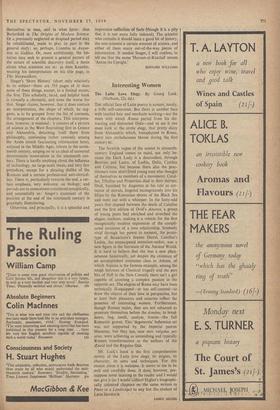Interesting Women
The Latin Love Elegy. By Georg Luck. (Methuen, 22s. 6d.) The Latin Love Elegy. By Georg Luck. (Methuen, 22s. 6d.)
THE official face of Latin poetry is austere, manly, a trifle self-conscious. But there is another face with tousled hair and tearducts working—not the mien with which /Eneas parted from his dis- tracting and distracted Dido—and to see it one must look at the erotic elegy, that pretty daisy from Alexandria which, transplanted to Rome, burst into orchidaceous bloom during the first century BC.
The feverish vogue of the sonnet in sixteenth- century England comes to mind, not only be- cause the Dark Lady is a descendant, through Beatrice and Laura, of Lesbia, Delia, Cynthia and Corinna, but because there also the prac- titioners were short-lived young men who thought of themselves as members of a movement. Catul- lus, Tibullus and Propertius died in their thirties; Ovid, banished by Augustus in his role as cor- rector of morals, lingered incongruously into his fifties by the Rumanian shores of the Black Sea and went out with a whimper. In the forty-odd years that elapsed between the death of Catullus and the first edition of Ovid's Amores, a group of Young poets had enriched and stretched the elegiac medium, making it a vehicle for the first recognisably modern expression of the compli- cated emotions of a love relationship. Intensely vivid through her power to torment, the proto- type of Baudelaire's Jeanne Duval, Catullus's Lesbia, the emancipated sensation-seeker, was a new figure in the literature of the Ancient World. It is hard to believe that she was a new phen- omenon historically, yet despite the existence of an accomplished courtesan class in Athens, of which Aspasia is the famous example, among the tough heroines of Classical tragedy and the pert bits of fluff in the New Comedy there isn't a girl capable of arousing a complex passion in the opposite sex. The elegists of Rome may have been technically ill-equipped—or too self-centred—to draw the objects of their love in perspective, but at least their pleasures and miseries reflect the presence of interesting women. Furthermore, though Roman males, they are not ashamed to prostrate themselves before the dontina, to break down, beg, insult, analyse, ironise—the full Romantic gamut. This 'degenerate' bohemian set was not supported by the imperial patron Maecenas, but they too, non ante vulgatas per artes, were achieving as astonishing and typically Roman transformation as the authors of the ./Eneid and the Regulus Ode.
Mr. Luck's book is the first comprehensive survey of the Latin love elegy, its origins, its character, its aims and techniques. For this reason alone it is welcome. It seems to me to be well and carefully done. It does, however, pre- suppose some learning in the reader and I would not give it (as I would Gilbert Highet's biographi- cally coloured chapters on the same writers in Poets in a Landscape) to any but the student of
Latin literature. '
JAMES MICIIIE


























































 Previous page
Previous page